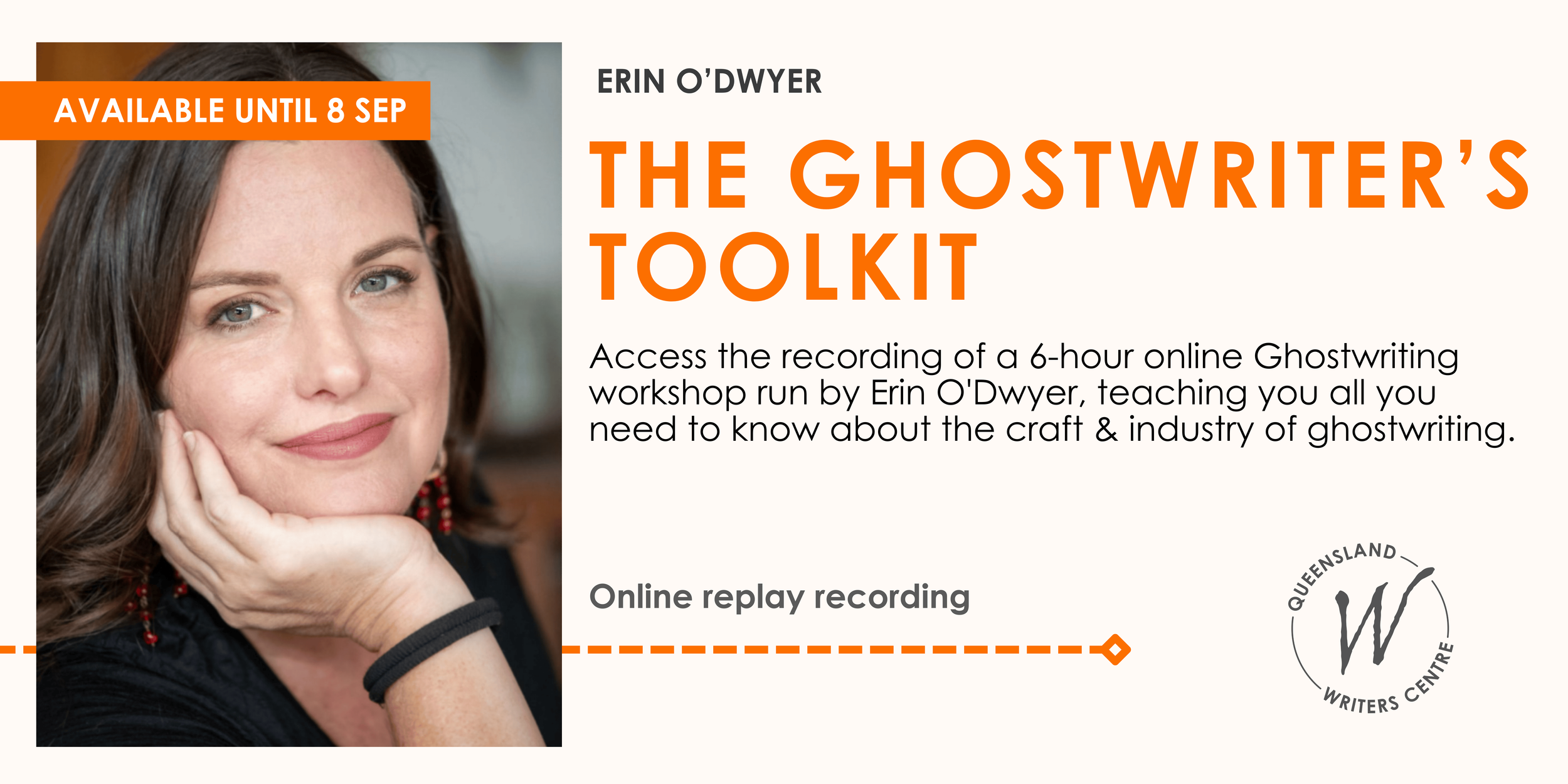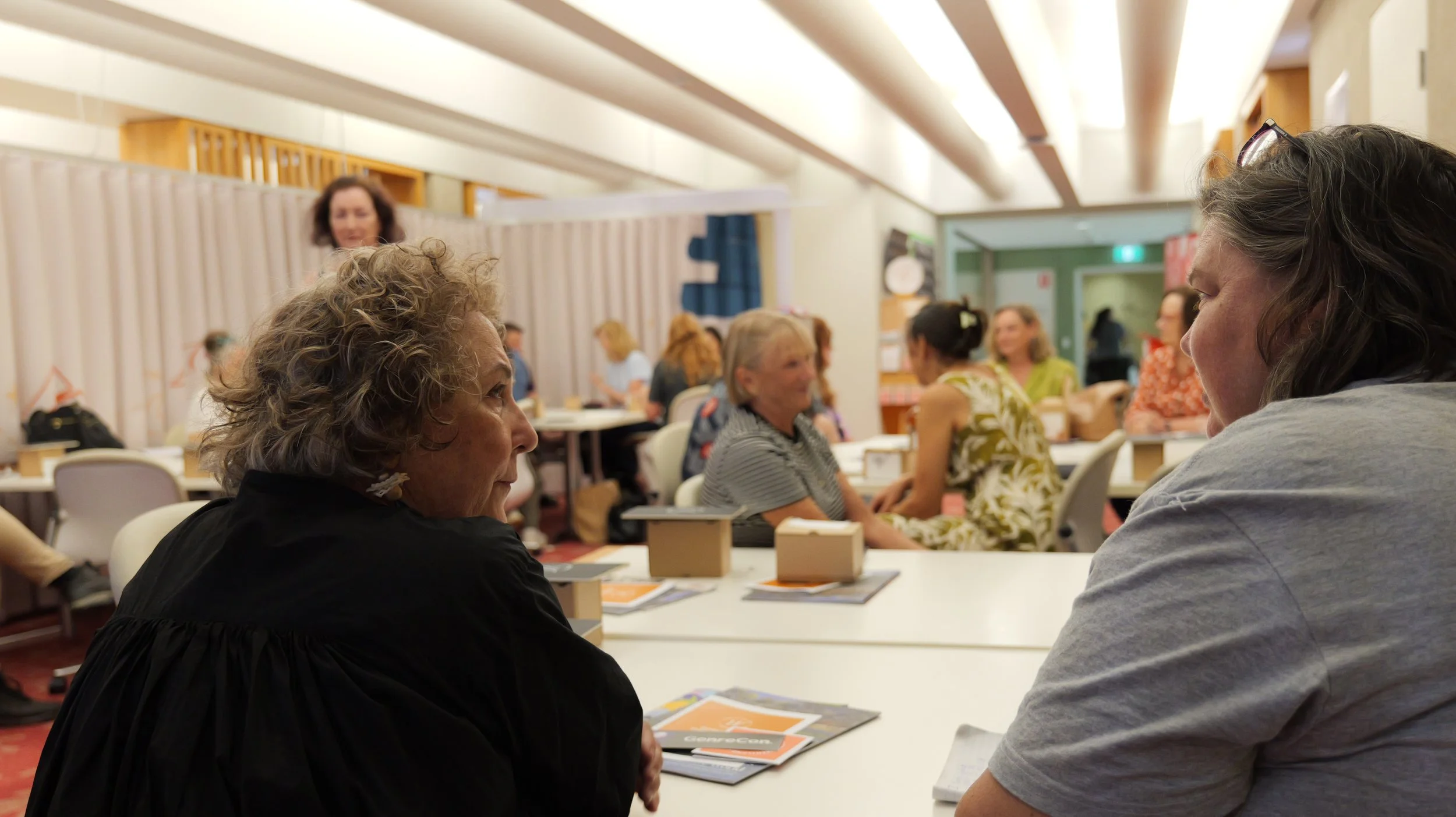Busting the Myths of Ghostwriting – Paige Blackwood
Ghostwriting is not about status; it’s about giving stories a voice.
There is a quiet horror in writing someone else’s story. Not the kind that rattles chains or drifts through walls, but the kind that lingers in the margins of a writer’s choices: the pressure to capture a voice without distorting it, and honour a life without overwriting it.
I found the idea of ghostwriting to be insurmountable at first, until Erin O’Dwyer joined us at Queensland Writers Centre to show me that ‘ghostwriting’ isn’t nearly as scary as it sounds. An award-winning journalist, writer and editor, Erin led The Ghostwriter’s Toolkit with candour and transparency. I was joined by five other writers, each of us prepped with a different story to share. What united us was a devotion to storytelling, and a desire to understand how one might preserve another’s voice without eclipsing it.
Erin kickstarted the session by talking about the difficult, often unglamorous labour that ghostwriting demands, which she referred to as ‘eating the frog’. She explained the emotional tax of holding another’s grief, triumphs, and half-remembered histories, and how the process of making time to write can be just as difficult as the craft. I could see many nodding heads, some wincing, relating this to their own writing careers.
‘Some days I was waking up at 4:00am to eat the frog,’ Erin admitted, reflecting on her work writing Swellbeing, with Blake Johnston. Her honesty set the tone for the session, preparing us to confront the myths and realities of the profession:
Myth One: ‘Ghostwriters are invisible and uncredited.’
While ghostwriters don’t typically receive public credit as the author, their contributions are often acknowledged within the industry and by the author themselves. Additionally, many ghostwriters build their own success and portfolios through their work.
Myth Two: ‘Ghostwriting is deceptive, “tricking” readers into believing the credited author wrote every word.’
In reality, ghostwriting is a collaborative process, where the client brings the story, and the writer brings skill, structure, and narrative expertise. It is not intended to deceive, but to offer the opportunity to express countless stories that might otherwise never reach the page.
Myth Three: ‘Only celebrities and influencers hire ghostwriters.’
Erin emphasised that clients come from all walks of life—politicians, athletes, business leaders, entrepreneurs, and everyday people with extraordinary stories. Ghostwriting is not about status; it’s about giving stories a voice.
Throughout the workshop, Erin unpacked her personal Ghostwriter’s Toolkit for us. We were guided through the different types of clients, and how to combat hurdles in communication. ‘You really get to know someone after a while—know their mannerisms,’ Erin said, reflecting on one of her clients. As Erin explained, these mannerisms ultimately give the story voice, and are important details to pick up on. Turns out, ghostwriting is a lot like being a detective, and when Erin shared her secret tools of the trade, I think we were all sitting on the edge of our seats. Her insight was invaluable, and throughout the workshop, we each learned how to be the compass a client needs to craft a marketable story.
By the end of the workshop, Erin’s hands-on exercises had us thinking critically, others ending in roaring laughter (but I won’t spoil why). Ghostwriting, I realised, is architectural: building truth and companionship from the ground up, piece by piece, story by story. I learned that we must hold a magnifying glass over key details, sleuthing out specifics that give the reader something to relate to.
As someone who had never delved into the world of ghostwriting before, I left with a newfound appreciation for the craft. Every anecdote, every pause in a client’s memory, is precious and deserving of careful stewardship. I left equipped not just to ghostwrite, but to honour someone else’s story. In Erin’s hands, the ghosts of others’ stories weren’t something to fear—they were something to shape, guide, and give a voice to.
Paige Blackwood is studying a Bachelor of Creative Industries, majoring in Creative Writing & Publishing and Journalism at UniSC. She is a current intern at Queensland Writers Centre.
Queensland Writers Centre intern Paige Blackwood attended recent online workshop The Ghostwriter’s Toolkit with Erin O’Dwyer (online replay recording available).
Attendees at a Queensland Writers Centre workshop.


